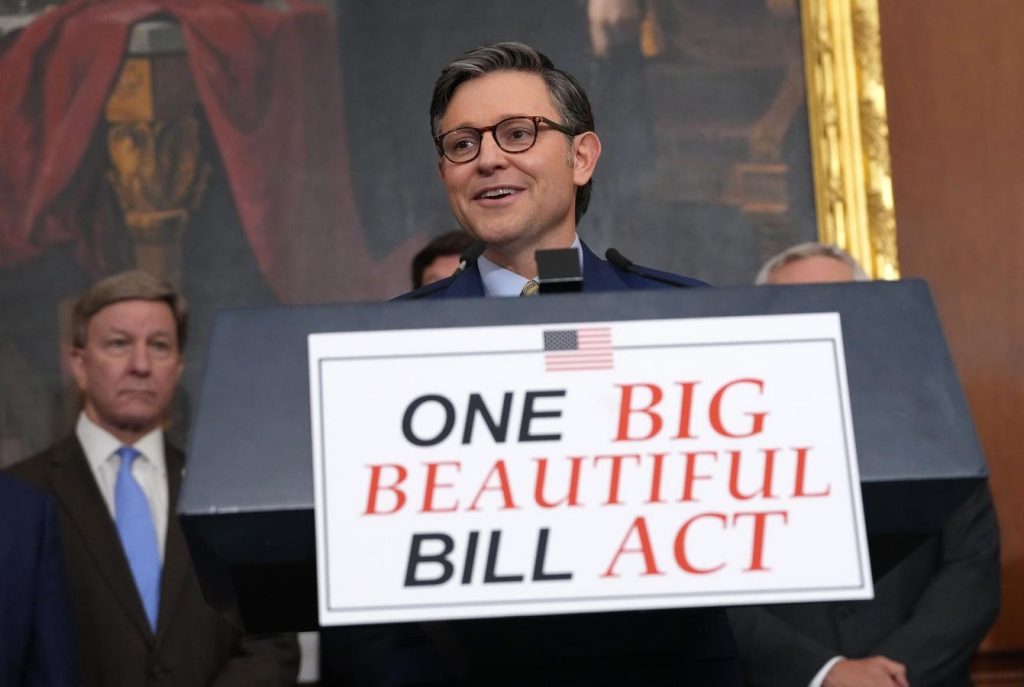WASHINGTON, DC – MAY 22: Speaker of the House Mike Johnson (R-LA) speaks to the media after the … More
This column was co-authored with my Tax Policy Center colleague Bill Gale
The recently-passed House budget bill, which extends all of the expiring provisions in the 2017 Tax Cuts and Jobs Act while adding tens of billions of dollars in new tax cuts, can be called many things, but tax reform is not among them.
Improving the tax system requires policymakers to carefully balance efficiency, equity, and simplicity. And in the current fiscal environment, it means achieving these goals while reducing, or at least not increasing, the massive federal debt.
These aims are challenging and often conflict with one another. But the recently passed House budget bill fails all four tests.
For example, broadening the tax base—getting rid of special interest tax breaks that create both complexity and inefficiency—is a hallmark of good policy. While the TCJA had some major flaws, it did take some steps to make the tax code simpler and more efficient. For example, it doubled the standard deduction, repealed some itemized deductions entirely, and capped the state and local tax (SALT) deduction.
But the House bill does just the opposite. While it scraps some complex and inefficient tax breaks, it extends many that were included in the original TCJA and adds lots of new ones> It also adds tax penalties for universities, immigrants, and low-income purchasers of health insurance.
Failing The Fairness Test
The legislation violates the principle of equity, or fairness, in multiple ways. By focusing most of its tax cuts on high-income households and businesses, it makes the tax code more regressive. In a new analysis, TPC finds the biggest beneficiaries in 2026 would be households making between about $460,000 and $1.1 million.
For example, it increases the estate tax exemption to $30 million for a couple, which would benefit perhaps a few hundred heirs of the very wealthiest decedents at a cost of more than $200 billion over 10 years.
And it treats those making exactly the same amount of income differently, often in arbitrary ways. Favored sources and uses of income get tax cuts while disfavored ones receive no benefit or in some cases even pay more in tax than under current law.
At the request of the president, tips, overtime, and interest on auto loans would be tax free. Workers would be allowed to contribute more, tax-free, to health savings accounts. Donors could take tax credits for contributions to scholarship programs for religious schools.
At the same time, colleges and universities would pay more taxes, and those with the largest endowments would pay taxes equal to the corporate tax rate on those funds. But the tax won’t apply to all colleges. The House Ways and Means Committee says the tax explicitly targets “woke elite, universities” but it exempts religious institutions.
Adding Complexity
Provisions such as tax-free tips and overtime will require pages of new regulations to prevent people from recategorizing income to avoid tax. In many cases, filers will go through a complicated exercise only to learn they are ineligible for the tax benefits. Similarly, the bill’s many phase-outs and delayed phase-ins will make economic decisions more complicated and uncertain.
For example, the House bill limits deductions for top-bracket taxpayers. And it does so through a complex two-part formula where 5/37 of the limit is based on their SALT deduction and 2/37 is tied to their other deductions.
Making Taxes Less Efficient
The bill repeals or phases out many 2023 Inflation Reduction Act tax subsidies aimed at boosting investment in green energy and encouraging consumption of US-made environmentally-friendly products. While the goal of slowing climate change is laudable, many of these subsidies were poorly designed.
But too often the new budget bill would do little more than replace subsidies for Democrats’ priorities with similar tax breaks for GOP-favored beneficiaries.
For instance, banks would get a $1 billion tax cut on interest they earn on farm loans. Multinational corporations would get a $900 million tax cut on income generated in the Virgin Islands.
The TCJA granted certain pass-through business, such as partnerships and sole proprietorships, a special 20 percent tax deduction. That provision mostly cut taxes for a select group of high-income business owners and encouraged them to restructure the legal form of their firms, a Tax Policy Center analysis found.
Making a bad idea worse, the House bill would increase the deduction to 23 percent and expand the tax break to cover even more high-income business owners, according to the NYU Tax Law Center.
But none of these tax breaks would contribute to economic growth based on everything we know from principles of sound tax policy or research evidence. All would require Treasury to write new rules to prevent abuses.
Losing Trillions Of Dollars
On top of all these problems, the bill would add trillions of dollars to the federal debt, which already is approaching $29 trillion. As written, it would cut taxes by $3.8 trillion over the next decade, according to the congressional Joint Committee on Taxation. But that assumes that many of the bill’s tax cuts will expire after a few years, a highly unlikely outcome given past experience and the fact that Congress is now voting to extend 2017 tax cuts that it set to expire at the end of this year.
The Committee for a Responsible Federal Budget estimates that if the bill’s provisions were permanent, the tax cuts would reduce federal revenue by $5.5 trillion over 10 years and add more than $6 trillion to the debt, including interest costs.
A little more than a decade ago, the then-chair of the House Ways & Means Committee, Republican Dave Camp of Michigan, proposed a revenue-neutral tax reform plan aimed at enhancing efficiency, equity, and simplicity. Since then, several groups have followed suit. Many blueprints exist. Lawmakers need to find the political will to follow one.

